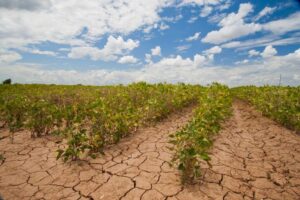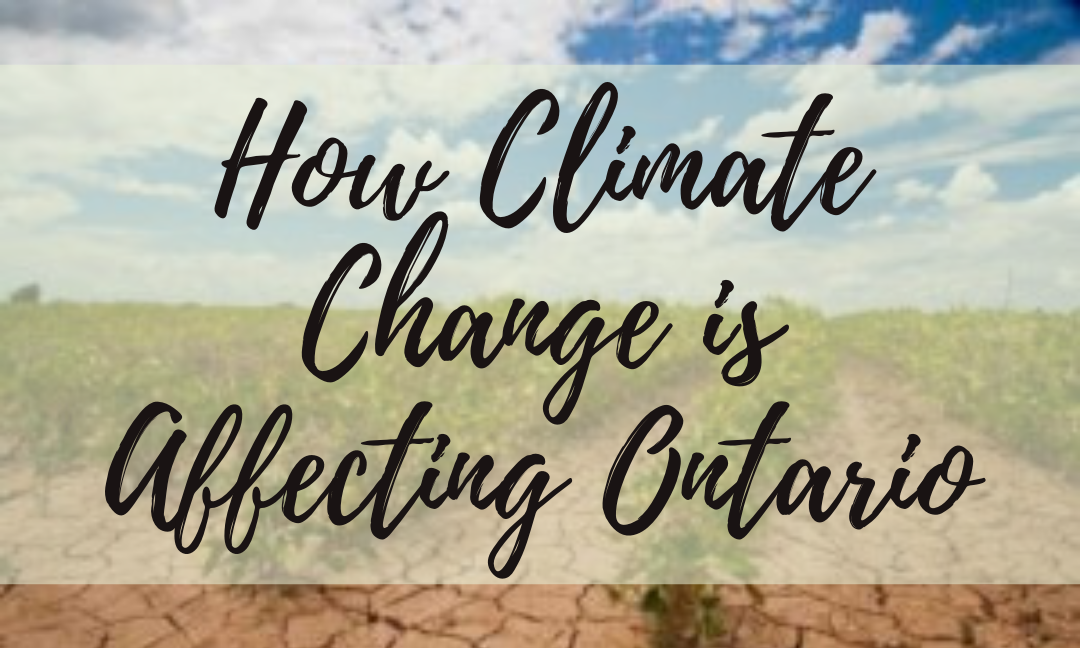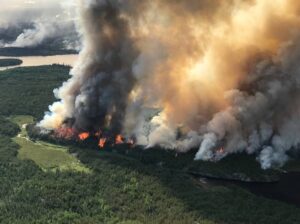Written by: Sameed Naushad
Canada is known to be one of the coldest countries in the world. It averages at about 1˚C throughout the year, with long and freezing winters, and often breezy summers. In June 2021 though, Canada broke an unexpected record. The country reported its highest temperature ever of a fierce 49.6˚C in Lytton, British Columbia. The heatwave created forest fires that destroyed buildings, causing the death of some individuals within the community.
The issue of climate change has been aggravating as it evolves. Its effects on Canada are becoming more noticeable and severe with frequent forest fires, heatwaves, and the overall change in weather. As with the heatwave in Lytton, climate change can become very deadly at a critical point. Some effects are being seen in Ontario as well, which may become more drastic in the future.
Natural Disasters: Tornadoes
To start, on July 15 2021 alone, five tornadoes hit Ontario. The most destructive one was reported in Barrie, which destroyed homes and flipped cars within a 5-kilometer range of damage. Though no deaths were reported from the event, many residents were still financially harmed by the tornado, losing their cars and homes. Events such as this one will only become worse as climate change becomes a bigger affair in Ontario.

Natural Disasters: Forest Fires
In addition, forest fires have already become a common issue for Ontario, too. Many of them are occurring in the Northwest, but there is no doubt that they will become more frequent in southern areas as well, due to the immense heat.
Just in a single day of July, 50 forest fires broke out in Ontario. Many evacuations took place as First Nations communities and residents were affected by the fire. Bad and smokey air quality was spread across Ontario, as well. The Government of Ontario eventually called for a hold in industrial operations as the situation worsened.
Change In Weather
 Lastly, the weather in Ontario has also seen some significant changes. The summer of 2021 has been very unusual. There have been many heatwave warnings issued and multiple thunderstorms. Urban areas have been seeing a lot of frequent precipitation, while rural areas are worried about their drylands.
Lastly, the weather in Ontario has also seen some significant changes. The summer of 2021 has been very unusual. There have been many heatwave warnings issued and multiple thunderstorms. Urban areas have been seeing a lot of frequent precipitation, while rural areas are worried about their drylands.
Scarborough was struck by a severe storm consisting of large hail pellets and frequent lightning strikes in June, which was unaccustomed to the area. The pellets of hail could have the potential of breaking through windows and damaging cars in a more severe case. Even with its minimal effect, this thunderstorm, like the many others occurring in Ontario, is sending a dangerous message.
Effects On Agriculture
The change in weather has also been affecting agriculture in Ontario. The weather is causing trouble for Ontario’s growing season, as lack of rainfall is causing droughts in rural areas. Farmers are worried about these droughts as they are harming crop-growing businesses. Grasshoppers have inhabited many prairie fields. Grasshopper pests usually attack crops, and a single grasshopper can eat up to a square foot of crops in a season. This had been an issue for farmers, and they are now being very scarce of hay to feed their cattle.

The Future
To conclude, we are seeing multiple examples of severe and impactful effects of climate change in Ontario. The issue is not to be taken lightly as these effects are harming lives, the economy, and are physically damaging the worth of millions. Without strong action now, the effects of climate change will become much even more damaging for Ontario.
We can start making a difference now by using less energy to be sustainable, emitting fewer greenhouse gases by taking fewer car rides, and creating less pollution and waste in general. Go to healtheplanet.com to learn about more issues that cause climate change, with tips on how you can make an impact.
Works Cited
Canada, Environment and Climate Change. “Government of Canada.” Canada.ca, / Gouvernement Du Canada, 26 May 2021,
Cary, Zulma. “Top 15 Coldest Countries In The World.” Earth and World 2021, 29 Jan. 2021,
earthnworld.com/coldest-countries-in-the-world/.
“Fluctuating and ‘Extreme’ Temperatures Makes for Difficult Growing Season in Northwestern Ontario | CBC News.” CBCnews, CBC/Radio Canada, 9 July 2021,
www.cbc.ca/news/canada/thunder-bay/gardening-temperature-extremes-northwestern-ontario-1.6096230
Higgs, Matt. “Ontario Must Work Harder to Meet Climate Change Targets.” KawarthaNOW, 26 June 2016,
kawarthanow.com/2015/07/09/climate-change-report/.
Inc, Pelmorex Weather Networks. “PHOTOS: Heat-Fuelled Storms Batter Southern Ontario with Hail, Heavy Rain.” The Weather Network,
McCarthy, Sarah. “Little To No Change In Red Lake Fire Situation.” CKDR,
www.ckdr.net/2021/07/16/red-lake-fire-update-3/.
Stephenson, Amanda. “Prairie Farmers Pray for Rain as Drought, Grasshoppers Ravage Crops and Pastures.” CTVNews, CTV News, 16 July 2021,
“Tornado Leaves ‘Catastrophic’ Damage in Barrie, Ont. | CBC News.” CBCnews, CBC/Radio Canada, 16 July 2021,
www.cbc.ca/news/canada/toronto/tornado-warning-environment-canada-1.6104484
“Weatherwatch: Canada Records Its Highest Temperature.” The Guardian, Guardian News and Media, 8 July 2021,
www.theguardian.com/weather/2021/jul/08/weatherwatch-canada-records-its-highest-temperature
Yourex-West, Heather. “’It’s Heart-Wrenching’: Drought Conditions Devastate Food Producers from B.C. to Ontario.” Global News, Global News, 22 July 2021,
globalnews.ca/news/8052530/canada-drought-food-costs


